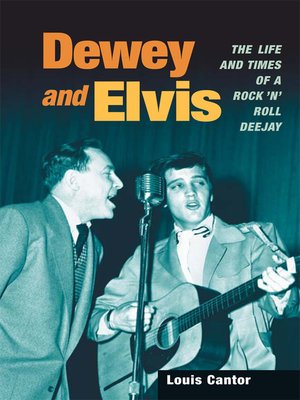Dewey and Elvis
ebook ∣ The Life and Times of a Rock 'n' Roll Deejay · Music in American Life
By Louis Cantor

Sign up to save your library
With an OverDrive account, you can save your favorite libraries for at-a-glance information about availability. Find out more about OverDrive accounts.
Find this title in Libby, the library reading app by OverDrive.



Search for a digital library with this title
Title found at these libraries:
| Library Name | Distance |
|---|---|
| Loading... |
Louis Cantor illuminates Phillips's role in turning a huge white audience on to previously forbidden race music. Phillips's zeal for rhythm and blues legitimized the sound and set the stage for both Elvis's subsequent success and the rock 'n' roll revolution of the 1950s. Using personal interviews, documentary sources, and oral history collections, Cantor presents a personal view of the disc jockey while restoring Phillips's place as an essential figure in rock 'n' roll history.
| Cover Title Page Copyright Page Contents Acknowledgments Introduction 1. Programmed Chaos: Dewey Phillips on the Air 2. Before the Storm: Dewey Arrives at the Five-and-Dime 3. The White Brother on Beale Street 4. The New Memphis Sound: The Birth of Black Programming 5. "What in the World Is That?" Is This Guy Black or White? Illustrations follow page 86 6. Racial Cross-Pollination: Black and White Together 7. The Great Convergence: Pop Tuner' One-Stop 8. The Phillips Boys: Soul (Better than Blood) Brothers 9. Red, Hot and Blue: The Hottest Cotton-Pickin' Thang in the Country 10. Dewey and Elvis: The Synthesized Sound 11. Dewey Introduces Elvis to the World Illustrations follow page 158 12. The King and His Court Jester: Men-Children in the Promised Land 13. "Red Hot at First . . . Blue at the Very End" 14. The Final Descent: "If Dewey Couldn't be Number One, He Didn''t Wanna Be" 15. "Goodbye, Good People" 16. The Legacy: The Next Generation and Beyond Epilogue Notes Bibliography Index | A Choice Outstanding Academic Title, 2006. — A Choice Outstanding Academic Title, 2006.|Louis Cantor is professor emeritus of history at Indiana University. He is the author of Wheelin' on Beale: How WDIA-Memphis Became the Nation's First All-Black Radio Station and Created the Sound That Changed America, and A Prologue to the Protest Movement: The Missouri Sharecropper Roadside Demonstration of 1939, which was made into an award-winning documentary film.







